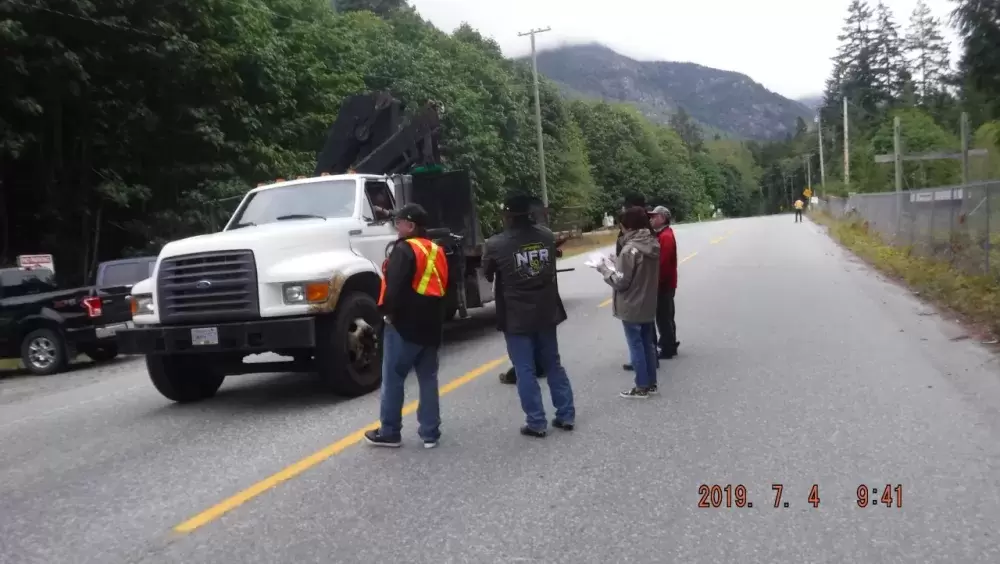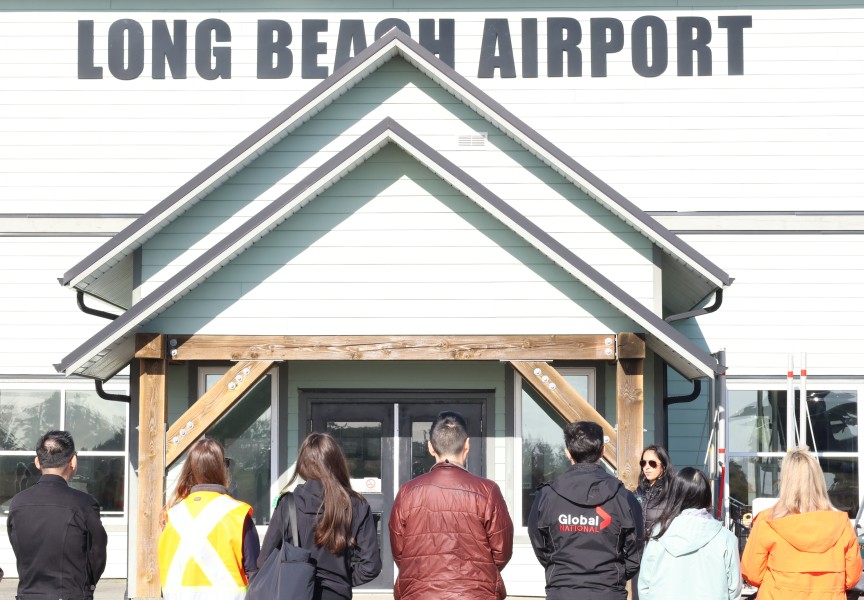Western Forest Products is trespassing on reserve land, thereby breaking a stipulation in the Indian Act, according to a message delivered in Gold River today by the Mowachaht/Muchalaht First Nation.
For decades the forestry company has used a section of Highway 28 to transport timber to a log sort in Muchalaht Inlet. But a portion of the road sits on the Ahaminaquus Indian Reserve No. 12, land held by the Crown for the “use and benefit of the respective band for which they were set apart,” according to section 18(1) of Canada’s Indian Act.
Ahaminaquus is held for the Mowachaht/Muchalaht, and today the First Nation restricted access to part of the road to express their right to the reserve. A statement issued by the nation noted how it has been left out of the industrial benefits of forestry operations on its land for generations.
“MMFN has seen no benefit and has received no compensation from WFP for this unauthorized use of the reserve lands at any time, and the road has been in trespass since the late 1960s,” stated the First Nation. “Mowachaht Muchalaht First Nation is a remote Indigenous community with little economic opportunity within its territory and is entitled to be compensated for the commercial exploitation of their lands. WFP is a corporate entity that achieves significant economic gains from its operations on the MMFN territory and its continued trespass on lands reserved for MMFN’s use and benefit.”
The First Nation issued this notice on the reserve land while Western employees and contractors were on strike. The walkout began July 1 amid stalled negotiations over pension plan changes and insufficient wage increases, according to the United Steelworkers union.
“The fact is, WFP has made record earnings in recent years and all of WFP’s own projections state markets are good and growing,” stated a USW letter to members. “With the rising cost of living, offering two per cent increases based on a different industry is not realistic.”
Approximately 3,000 workers walked off the job on July 1 after a previous agreement expired in mid-June. Earlier last month the company announced “temporary production curtailments” at three of its Vancouver Island sawmills to “match current customer demand.”
“After cancelling scheduled bargaining sessions and refusing mediation, it’s clear that the USW is intent on inflicting damage to the coastal forest industry which already faces significant market challenges, including having to pay the highest softwood lumber duties for shipments to the United States of any jurisdiction in Canada, and the loss of market share in Japan due to Japanese government subsidies for their domestic industry,” said Western President and CEO Don Demens in a statement from the company.
This is not the first time the Mowachaht/Muchalaht have exercised their right to the road that crosses over Ahaminaquus. In the 1970s members of the First Nations held a protest at the same site, resulting in nine arrests.
“We thought we were making good progress in developing an agreement that would allow WFP to travel through IR12, while providing a small amount of compensation to our community,” said Tyee Ha’wilth Mike Maquinna. “However, recent correspondence with WFP indicates they are not taking us seriously in our attempts of signing a road use permit that covers the historic trespass and sets out fees for future use of the road.”
“From our perspective, we’re optimistic we can achieve a mutually beneficial agreement through further discussion,” said Western’s Director of Communications Babita Khunkhun. “We value our relationships with First Nations and we have a long history of working collaboratively with the Mowachaht/Muchalaht First Nation.”
The Ahaminaquus reserve represents a tiny portion of the Mowachaht/Muchalaht First Nation’s territory, an area that stretches from the middle of Vancouver Island to cover Nootka Sound. For generations this land has been subjected to extensive forestry operations.
“As one of the hereditary chiefs of our nation I have always wanted our people to be successful, have good lives and provide for their families,” said Maquinna. “The chief’s responsibility includes managing the resources within our traditional territory and to ensure our jurisdiction over our reserve lands is respected.”







